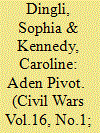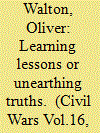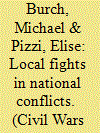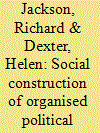|
|
|
Sort Order |
|
|
|
Items / Page
|
|
|
|
|
|
|
| Srl | Item |
| 1 |
ID:
131763


|
|
|
|
|
| Publication |
2014.
|
| Summary/Abstract |
This article argues that the Aden Insurgency was a pivotal moment in the history of British counter-insurgency. We argue that it was in Aden where the newfound strength of human rights discourse, embodied in Amnesty International, and of anti-colonial sentiment, expressed by the UN General Assembly, forced the British government to pay attention to public perceptions of colonial brutality. Using archival sources, we foreground three episodes in the history of the insurgency to support our argument and to illustrate that the changes witnessed were not the result of 'learning' but of a fundamental shift in the international environment.
|
|
|
|
|
|
|
|
|
|
|
|
|
|
|
|
| 2 |
ID:
131762


|
|
|
|
|
| Publication |
2014.
|
| Summary/Abstract |
This article revisits the security dilemma theory and its application to civil conflict. Based on a careful reading of existing studies, it exposes the deviations from the original theory developed in the 1950s and more recent amendments, which have substantially reduced the explanatory value of the theory. The article shows that when the original and the amended versions of the theory are applied to civil conflict, neither can explain the outbreak of armed conflict. While anarchy might be present as a precondition for the dilemma to operate, a previous history of violent interaction often leaves little room for misperception of intentions. Absent uncertainty about malign intentions toward the other group, the security dilemma theory loses relevance to explain the outbreak of civil conflict.
|
|
|
|
|
|
|
|
|
|
|
|
|
|
|
|
| 3 |
ID:
131761


|
|
|
|
|
| Publication |
2014.
|
| Summary/Abstract |
This article assesses the potential for evidence-informed policymaking in the field of mediation. It argues that one of the key barriers to evidence-informed policymaking in this area is the disjointed character of the existing literature and finds that methodological and theoretical tensions lie at the heart of policy debates around mediation. While differences in theoretical, epistemological and normative perspectives of the existing research have made it difficult for policymakers to draw clear conclusions from the available evidence, the article nevertheless identifies a degree of convergence around certain key themes such as the importance of legitimacy in determining conflict outcomes and the benefits of combining quantitative and qualitative methods. It concludes by highlighting the importance of policy experimentation, evaluation and building capacity for policy learning in mediation policymaking.
|
|
|
|
|
|
|
|
|
|
|
|
|
|
|
|
| 4 |
ID:
131760


|
|
|
|
|
| Publication |
2014.
|
| Summary/Abstract |
How do rebel groups determine their targets during intrastate conflict? We build upon two competing theories in conflict studies that emphasize either the social or economic determinants of violence during war and use geographic information systems (GIS) analysis to explore these competing theories. To do this, we utilize a subnational analysis of the most likely case of the Democratic Republic of the Congo to understand whether ethnicity or natural resources motivates the location of conflict events. Accounting for geography, we find that economic endowments in the form of natural resources are highly related with the number of violent attacks, while the presence of competing ethnic groups does not offer much help in understanding the location of conflict events.
|
|
|
|
|
|
|
|
|
|
|
|
|
|
|
|
| 5 |
ID:
131759


|
|
|
|
|
| Publication |
2014.
|
| Summary/Abstract |
This article proposes a general analytical framework for how we might better understand intrastate war and related forms of organised political violence. It begins by setting out our understanding of agency and structure, before outlining the key structures and agents central to the social construction of political violence. This is followed by a discussion of some of the common discursive practices frequently observed in the lead-up to the outbreak of organised violence, such as the widespread articulation of threat and victimhood narratives, the demonisation and dehumanisation of an enemy other, the renegotiation of norms of violence and the suppression of counter-hegemonic and anti-violence voices. The article argues that organised and sustained political violence is contingent on two key facilitating conditions. First, the presence of a particular set of material and discursive structures, including the military instruments for sustained violence, an economic basis for prosecuting war and a set of society-wide military norms, values and practices; and second, willing and capable agents who can transform the structural potential of the society or group into active participants in violence. The interaction of structures, agents and discursive practices can, in particular historical and spatial contexts, create the specific conditions which make organised violence possible. The discussion is illustrated by reference to a number of recent and historical wars, including the war on terror
|
|
|
|
|
|
|
|
|
|
|
|
|
|
|
|
|
|
|
|
|